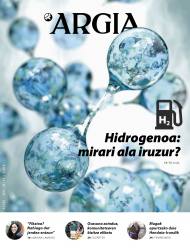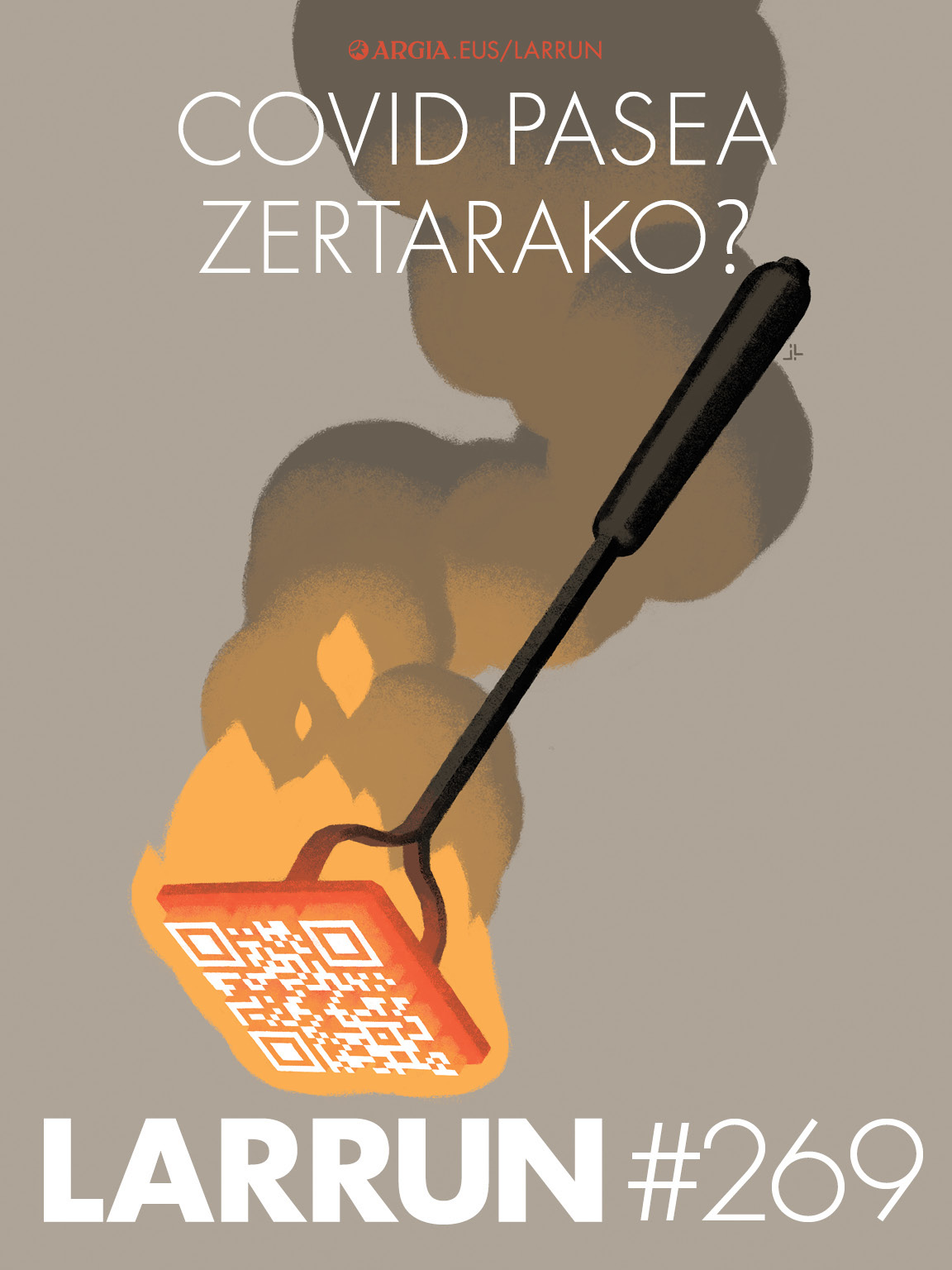With health measures the community must live on the street
- In this “new normality”, community life is very limited and relations, pleasures and rites necessary for the person have become almost sins. However, since the beginning of the pandemic there have been a number of Community initiatives that have been developed or maintained in line with health measures. We have heard three of them: Cultural activity in Altzo, Food fair in the neighborhood of Egia and work of the housing union of the Casco Viejo de Bilbao.
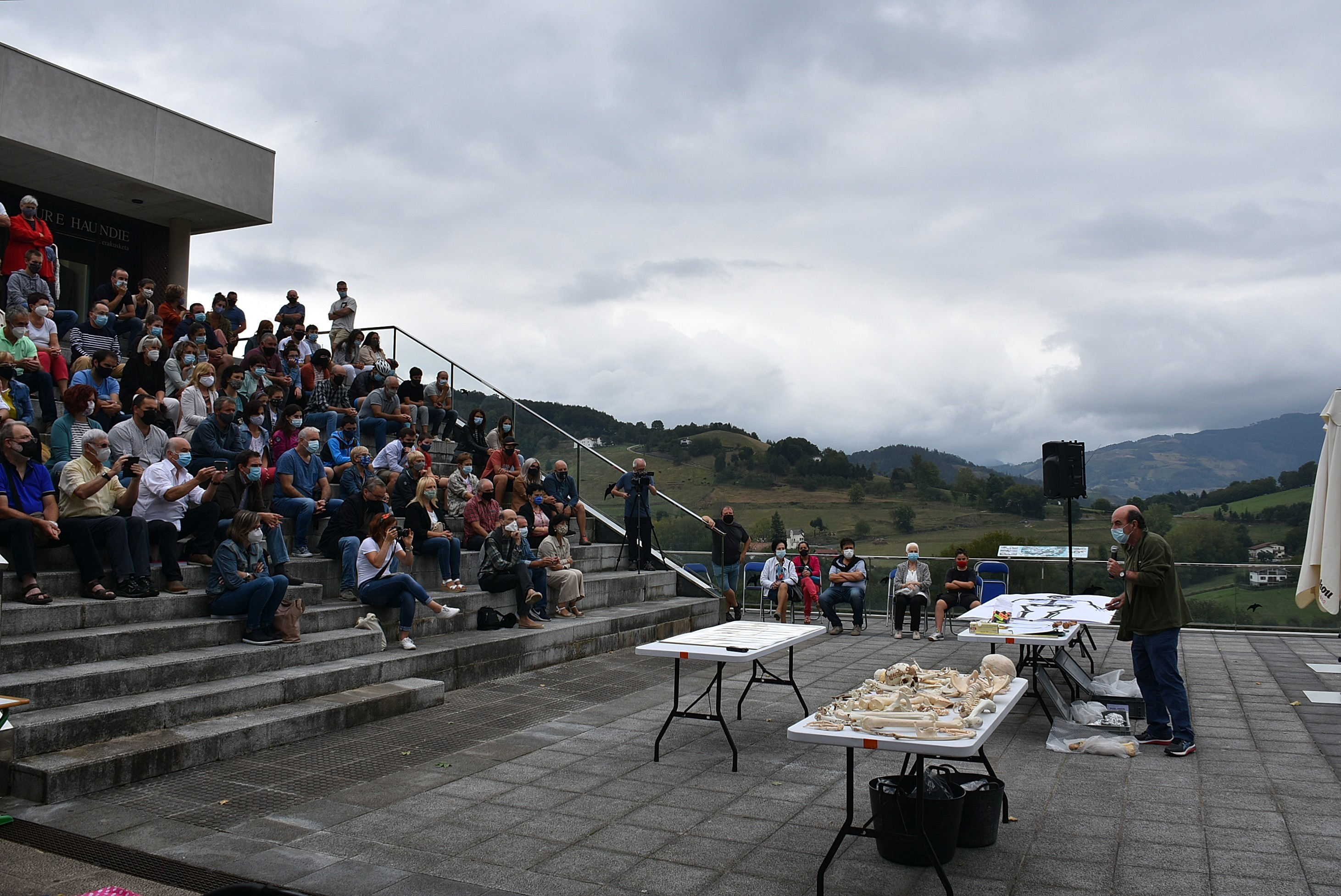
The psychologist Kontxi Alicoste, defines the World Health Organization as the physical, emotional and social well-being of a person: “In this pandemic, these two approaches to health are conflicts, avoiding death on one side and achieving comprehensive health on the other. Comprehensive health has been completely forgotten, especially in its social dimension.” It emphasizes that the zero risk of contamination by COVID-19 does not exist and that, therefore, in order to achieve comprehensive health, the risk of contamination must be constantly balanced, weighing the risk that is assumed and the one that wins: “Integral health does not mean achieving full happiness, integral health means having a good development and being psychologically well in a balance: a worse and a better day and not losing the meaning of one’s own life. Because this situation is at great risk of being de-identified with anything. I am not saying that we should not take protective measures, but that we should do, we should do a few things. But a unique thought has been opened, and that is very dangerous: there is fear of explaining a position, even if it only says very sensible things, because they will consider you as a negationist.” Without being chained in the nostalgia of past life, how do we have to live now? Do we have to be home or reclaim the life of the community by adapting to the new situation?
Members of the Altzo City Council and local agents met in June last year to decide whether or not cultural events and festivities are maintained. They decided to keep health measures carefully, a consensus that served as the basis for the whole year.
Almost a year ago, as soon as he left the lockdown, these questions were raised and more locally in Altzo. “In April-May we started to hold telematic meetings in the Committee on Culture. The Festival Commission also wondered if there were to be parties or not, the City Hall also had concerns about this... Therefore, we agreed to bring together the members of the city council and the agents – association of parents, party commission, women’s group, Elordi association… –”, explains Jexux Murua, member of the Culture Committee. This meeting was held in person in June. Lorena Uriarte, councillor of the City of Altzo, recalls the different positions that took place at that meeting: “There were fearful attitudes: How are we going to do it to avoid agglomerations? Do parties or not?” Despite the different perspectives, they claim that they reached an agreement “easily” and that was what laid the basis for deciding what to do with the acts throughout the year.
Uriarte remembers the approaches that reached the consensus: “Why don’t we go ahead with these actions but in a few days, instead of accumulating them, extending over the summer? This seemed pretty good to all of us. But the feeling of a party, we wanted to live San Ignacio Day. That day we put two activities, one for the next day... that people felt there were parties as well." Yes, they took away meals from all the parties of the year.

“Parties” and activities
The tendency of the majority of peoples has been to suspend normal acts and to virtually fail to do the right thing to the present situation. Murua explains why from the beginning they decided to keep the festival and cultural dynamics in Altzo, adapting to the pandemic: “Because we citizens need socialisation and the maintenance of public life, within the conditions required by the situation, of course. From the outset we were aware that this disease is not a joke, that it is a matter to be taken seriously. But we were also aware of the characteristics of our people: it is a small, broad village of areas, and therefore gives us opportunities. We didn't want to enter the parties, but we didn't want to get into the impasse of non-parties. We didn’t want to do anything that brought people from outside, but to provide citizens with an opportunity to continue with our lives.”
Uriarte and Murua recall the great weight that the life of cultural creators had in deciding whether or not to maintain initiatives: “We said this: we should not interrupt events because, on the one hand, it will benefit ourselves, and on the other hand, those people who have their activity based on creation and culture and that is very necessary.” It was agreed in that People ' s Assembly to take specific action on the dates indicated and to give monthly continuity to people ' s life and culture. Murua associates the path broken by Altzo with the concept of “new normality”: “We said from the beginning, we will not be waiting for the arrival of ‘new normality’, we will have to bring it, right? We will have to build that normalcy among ourselves.”
"We have tried to create safe spaces (...) but why shouldn't we treat people as adults?" Jexux Murua, Committee on Culture
In the activities they have organized, care has been taken with rigor to prevent the following: “We have tried to create safe spaces. We do not charge tickets for the events, but the ticket does have to be taken to take care of the capacity, many people have participated in the ordination of the public and in the organization of the tickets and exits, we all wear the mask and respect the spaces, we have organized all the possible events outside... I think that has also given people confidence, feeling ‘doing things well’,” says Murua. The opposite argument you have heard is that if 80 people meet for a cultural act, then everyone will go to the bar and gather there. Murua: “There comes belief in the person’s instinct. Why shouldn't we treat people as adults? In Pandemia I have felt from the very beginning that we have all been welcomed as children. If I'm alone in Altzo Square, I don't feel the need to be dressed in a mask, and I don't think I'm running at anyone, but I think I'm doing a great favor to myself. But at the same time, if we're doing this interview, I know I have to put it on. It’s a very simple thing.”
Fortunately, it has not touched them to spread these cultural acts. “But how do you know when it’s going to catch you? Where? How? At work, at shopping, at church or at home, the risk is everywhere. You can't know, and we all have some example all around us. The disease is there and we're nowhere. I do not believe that we have lost our perspective, and that we are talking about negligence. We have not turned our backs on the disease, we have recognized its strength, but we are turning our faces and trying to make life as complete posible.Sabemos that we cannot walk as we want, but things can be done, and the test is the lot of actions that have been done in us,” Murua said. They have carried out more than twenty-four activities of all kinds: colloquium, ball championship, tree planting, bertso saioa, painted mural... The Feast of San Juan was one of the first activities that were organized by changing the way: “In other years there is fire next to the pediment, the dantzaris come out of the village and some of the inhabitants come down from the mountain representing the witches, making a kind of akelarre. And verses are also sung,” explains Uriarte: “Last year it was fired and danced, but the descent of witches was not made. And we had people sit in the chairs to listen to the bertsolaris." So the programming began to work gradually until the end of
July and after October and December... with the aim of maintaining the life of the people throughout the year.
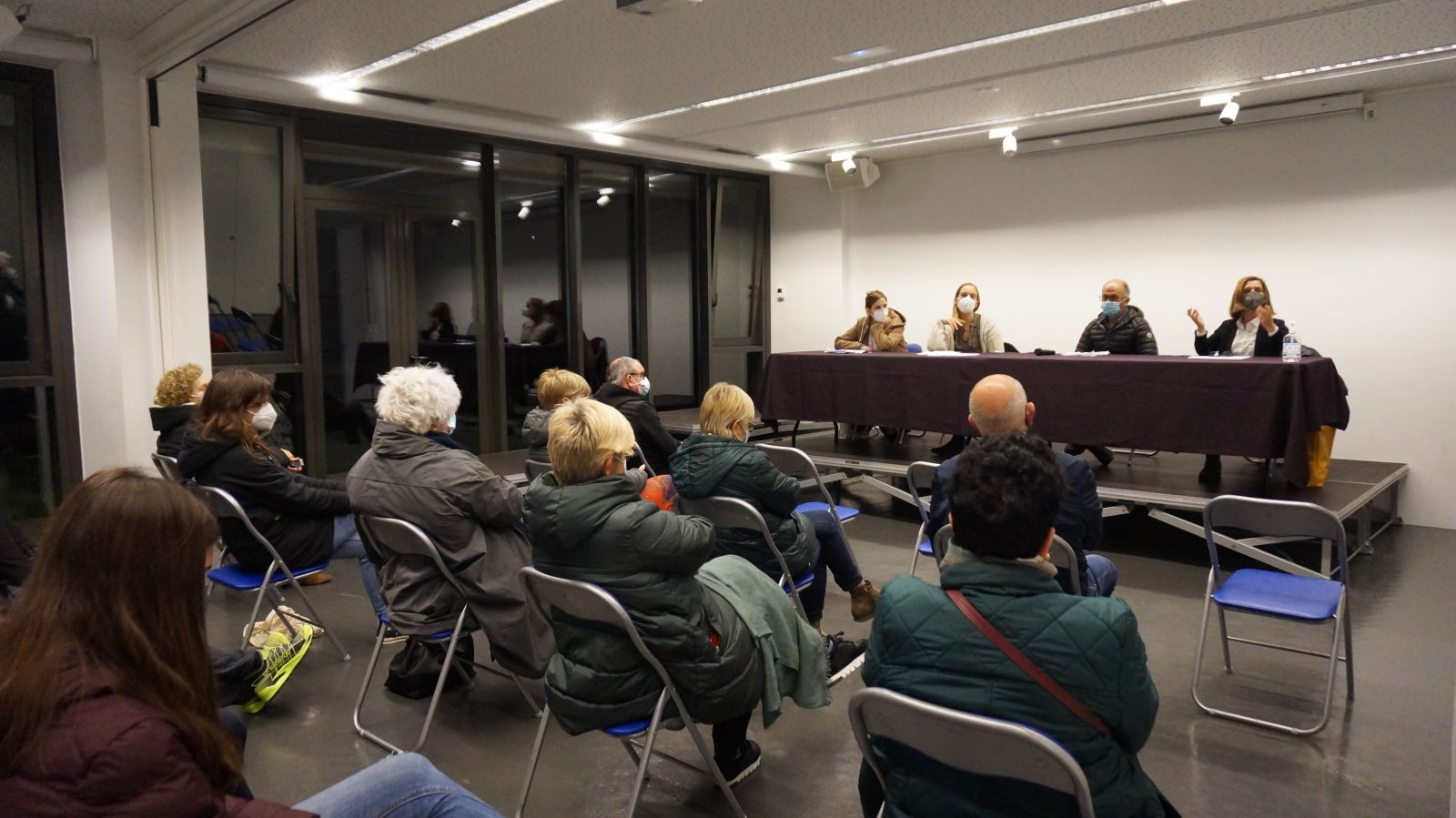
More and more needed
"To survive we have more than ever some actions of this kind, which also mark the calendar, which make us feel that not every day are the same" Lorena Uriarte, councillor of Altzo
Uriarte explains that at first he lived these initiatives as a way to stimulate body builders, but that in recent times the perception has changed: “I think they are very good for our mental health. Now I am fully receiving, we have more than ever a series of actions of this kind, which also mark the calendar and guide us, which make us feel that not every day are the same”. Murua confirms that this feeling of Uriarte is widespread: “Every year during the month of December we organized a week of cultural activities, within the cycle Curiosity at the Olentzero. Last December there have been more people than ever. I think people were very grateful that there was a reason to leave the house and look in the eyes. Emotions moved a bit, some things were said... And they were things like the ‘mojones of the people’! Every time 30 people came. I think in a town of 400 people it’s a lot to come and listen to a conference on the mojones.”
The psychologist Alicoste explains that spaces to think together, like these round tables, are very important: “Personal reflection on how to live in Pandemia is very difficult, requires contrast.” Among the cases he observes in his daily work, he is concerned about the increase and proliferation of tables of dependence on social phobia and screen games: “Now you can live like this. In addition, it has been a saving technology, now the diabolical has become a social staple. And that's what I'm really worried about. Because human beings develop in contact, our problems arise in relation, but we solve them in relation.” He explains that in the community we donate, receive and that helps a lot, “because we feel we are not alone.” Cultural activities, whether music, theater, dance...
"Feeling pleasure keeps us psychologically alive, and the species also keeps it pleasure! You also need fun, now you will do it differently, but don’t leave it out” Kontxi Alicoste, psychologist
points out that they link us to emotions and that is why it is important to attend these types of events: “Although you get used to being quiet at home and you feel lazy to leave, even if... you go.” He says that we have to oppose comfort a little: “Well-being should not seek comfort. The goal of well-being is to achieve good development.” To strengthen the relationship with life, he recommends trying to do things that generate pleasure: “Feeling pleasure keeps us psychologically alive, and the species also keeps it pleasure! Fun is also necessary, now you can get it in another way, but get it, don’t put it aside.” At a time when society at large has expanded, it has remembered the exercise it puts depressants in: “What did you like to do before? Well, that's what you have to do, twice a week. But they say ‘But I don’t bring him the pleasure he brought before him’, OK, but it doesn’t matter. Because this exercise isn't right now to give you pleasure. But in that fact, you will take it again.”
He emphasizes the need for rituals: “If it wasn’t for the seasons, without rituals or parties, it’s a feeling that we’re always the same, and that makes it all the more daunting. Psychologically, rites are very important, because all rituals have a meaning, they put something in value and they are milestones to go from one phase to another. Parties are also for that: to feel that we are alive and that time is not in vain.” When, instead of the patron holidays, very simple things have been done, many people have thought “this is not worth it”, but Alicoste does not agree: “That’s what it says, but yes, but it’s better to do something.” Taking into account the importance of community life and social stimulation in the well-being and development of people, Aliscostes points out that the measures put in place in some moments and contexts for the search for “zero risk” have had a negative impact on the most vulnerable populations: “For example, in many villages during the summer there have been no open colonies, which has caused the children who were already socially engaged to become even worse. Some resources, such as day centres for people with cognitive disabilities or mental health problems, have been closed down, which means for these people and their families. It may be necessary to take measures quickly and without exception, but from now on it will be necessary to balance the level of risk and benefit, and to take the necessary measures to continue these resources. Plus, zero risk doesn't exist."

Balance and tensions
A round table on a pandemic was held in Altzo in December with the participation of two doctors, a psychologist (Alicoste himself) and a farmer. “The relationship and tension between mental and physical health was explained at that table,” Murua said. As we have seen, the psychologist Alicoste explained that the popular life being done in Altzo is very important for the person’s balance. The ICU physician pointed out “yes, but wait, not yet”. “And among the public there were also two such poles,” Uriarte says. Alicoste has valued the issue and teamwork: “There is nothing like sharing to remove fear, to know the thoughts of others, to see what others do... these things are the most important to work fear.” The worst thing about this pandemic is to “see social relations as enemies,” for him: “That’s very painful. I don't think it's going to stick, but maybe it is."
Murua confirms the Altzo initiative: “We have chosen to take advantage of the opportunities we have in our country, convinced that we maintained that balance. And the results help us to say we've done it right." In many towns the activity of the collectives has slowed down considerably, in Altzo it has not been: “The women’s group is more active than ever. Young people also have their strength, the Committee on Culture has been renewed and rejuvenated... Fortunately, it is an active people.” This will also be influenced by the fact that the organization of events has been committed throughout the year.
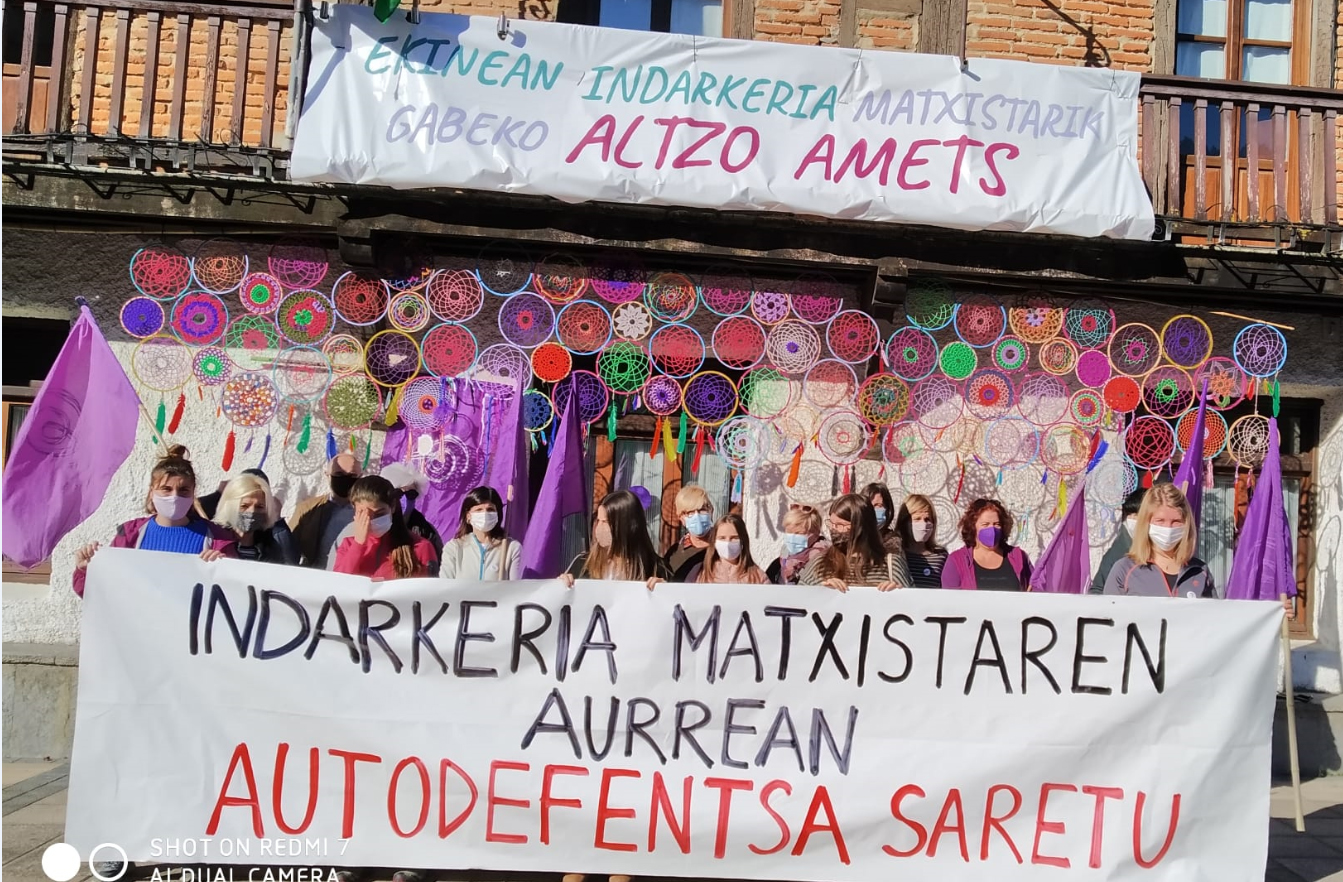
Katalunian Societat Catalana de Pediatria elkarteak pandemia kontrolatzeko ikastetxeetan aplikatzen diren neurriak bertan behera uzteko eskatu du, neurri horiek haurrengan dituzten ondorio kaltegarriak argudiatuz. Tartean dago gela barruetan maskararen erabilera kentzea, modu... [+]
Like so many others, we went to the demonstration called in Bilbao against the passing of COVID-19. I was very happy to see how many people there were in her of different ages, colors, dresses and languages, and I found among them friends of battles from the university or... [+]
Zarauzko Udaleko urtarrileko osoko bilkuran, galdera erantzunen txandan sei herritarrek hartu zuten hitza, eta Covid pasaporteak eragindako diskriminazioa eta beren bizipenak azaldu zituzten; tartean, pasaporterik gabe kiroldegira sartzeagatik atxilotuta bukatu zuen... [+]
Bermeon jaiotako eta bertara etorritako herritarren artean hilean behin egiten zuten tertulia dago Lurre Hurre proiektuaren oinarrian. Elkar ezagutu zuen herritar talde horren harremanetik abiatuta, eta konfinamendu garaian migratzaile askok bizi zuten egoeraz jabetuta, egitasmo... [+]
Joseph Andras (Le Havre, Frantzia, 1984) idazlea da. 2016an lehen eleberriagatik "Goncourt" sari famatua eman zioten, baina berak uko egin zion epaimahaiari esanda “lehia, konkurrentzia eta norgehiagoka arrotzak zaizkiela idazketari eta sorkuntzari”... [+]
Lehen mailako arretak “kolapso egoeran” jarraitzen duela uste dute, ospitaletako arretak bizi duen gainkarga salatu nahi dute, eta egoerari aurrea egiteko neurriak eskatzen dituzte ELA, SATSE, LAB, CCOO eta UGT sindikatuek.
Abenduaren 20an eman zuen jakitera Olentzeroren Lagunak elkarteak 2021ean ere ez zela Olentzero Iruñeko kalez kale ibiliko, pandemiaren egoerak horretara bultzatuta. Urtarrilaren 4an, aldiz, Iruñeko Errege Magoen Kabalkadaren Elkarteak adierazi du aurten kaleetara... [+]
Honela adierazi du Gazte Koordinadora Sozialistak zabaldu duen oharrean: "Zentzu sanitariorik gabeko neurriak hartzen jarraitzen dute politikari profesional despotikoek". Berriki hartutako hiru neurriak salatu dituzte zehazki: COVID ziurtagiriaren zabalpena, aire... [+]
Osakidetzaren lehen mailako arretaren egoera "jasanezina" dela salatuz Araba, Bizkai eta Gipuzkoako osasun etxeen aurrean elkarretaratzeak egin dituzte. "Lehen olatua izan eta urte eta erdira, osasungintza urria, nekatua eta baliabiderik gabea daukagu",... [+]
LAB sindikatuak honako irakurketa plazaratu du: "COVID kutsatzeen olatu berria dela eta, Eusko Jaurlaritza, Nafarroako Gobernua eta Frantziako Gobernua COVID ziurtagiriaren ezarpena erabiltzen ari dira euren kudeaketaren hutsuneak ezkutatzeko. Bost ardatzetan neurriak... [+]
Urtero Bilboko Konpartsek San Tomas egunaren harira argitaratzen duten egutegiaren etekinak Etxaldeko Emakumeei emango dizkiete aurten.
Abenduaren 18 arratsaldean Donostian jendetzak hartu ditu kaleak, Bizitza plataformak deituta egin den manifestazioan. "COVID pasearen inposaketari ez" lemak elkartu ditu.
Abenduaren 14an Osasun Publikoaren Aldeko Herri Ekimenak 1.000 erreklamaziotik gora aurkeztu ditu Donostiako Eusko Jaurlaritzako Osasun sailean, bereziki Lehen Arreta eta oro har osasungintza publikoa indartzeko eta duintzeko eskatuz: "Osasun sistema publiko,... [+]
Gazte Koordinadora Sozialistak deituta, protestara jo dute ostiralean Bilbon, Donostian eta Gasteizen. 'Covid ziurtagiriari ez! Burgesiaren ofentsibari aurre egin' izan dute aldarri milatik gora lagunek.







